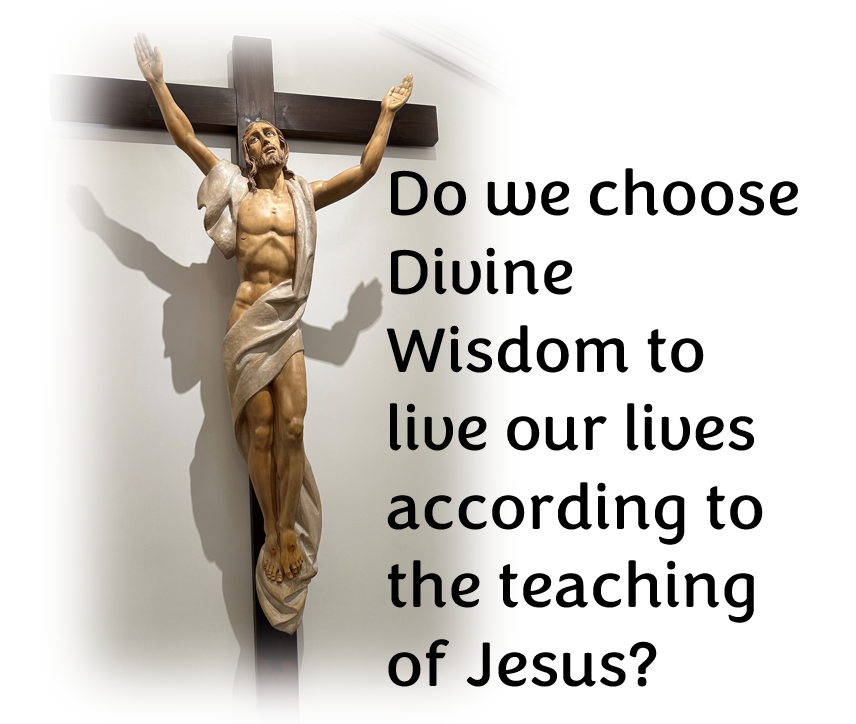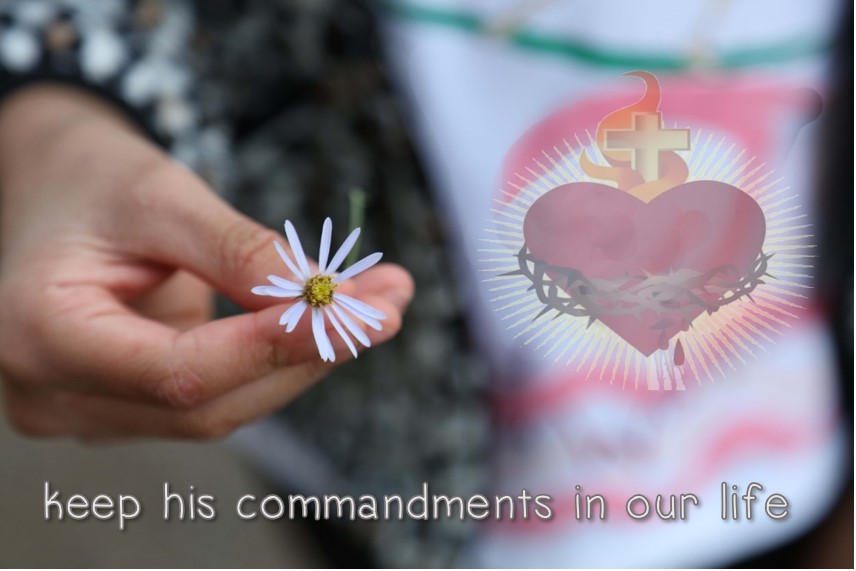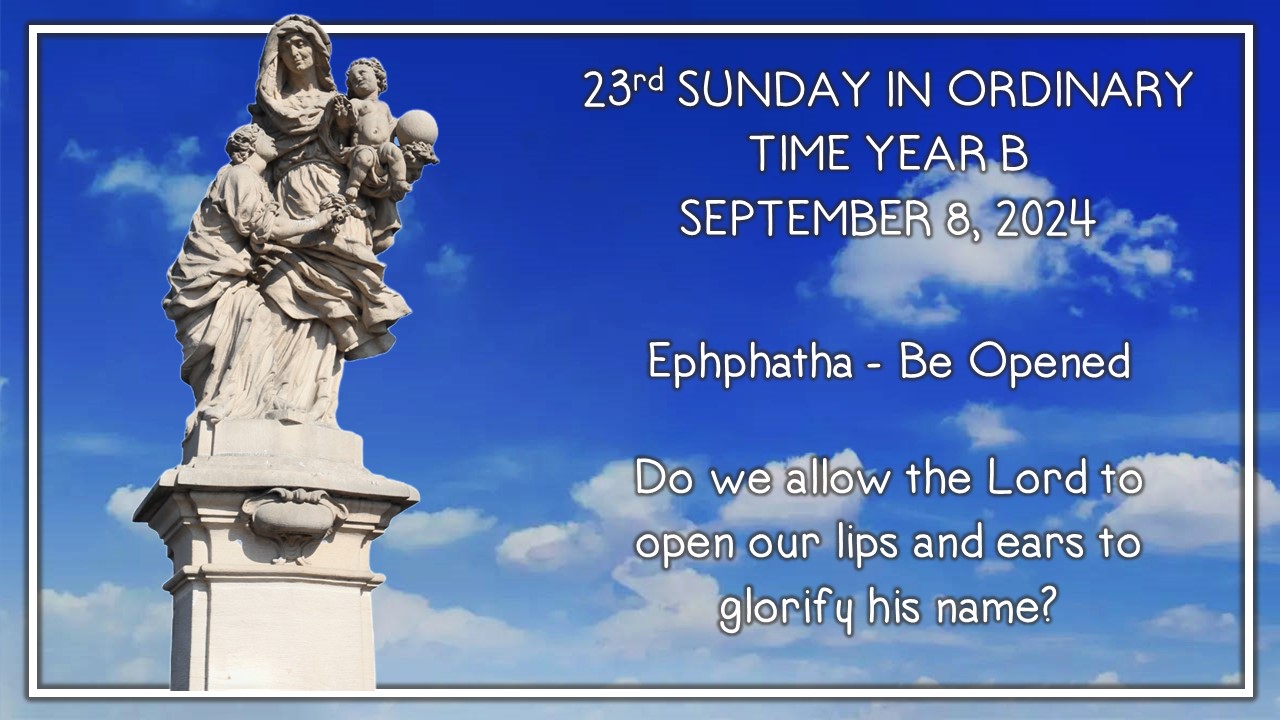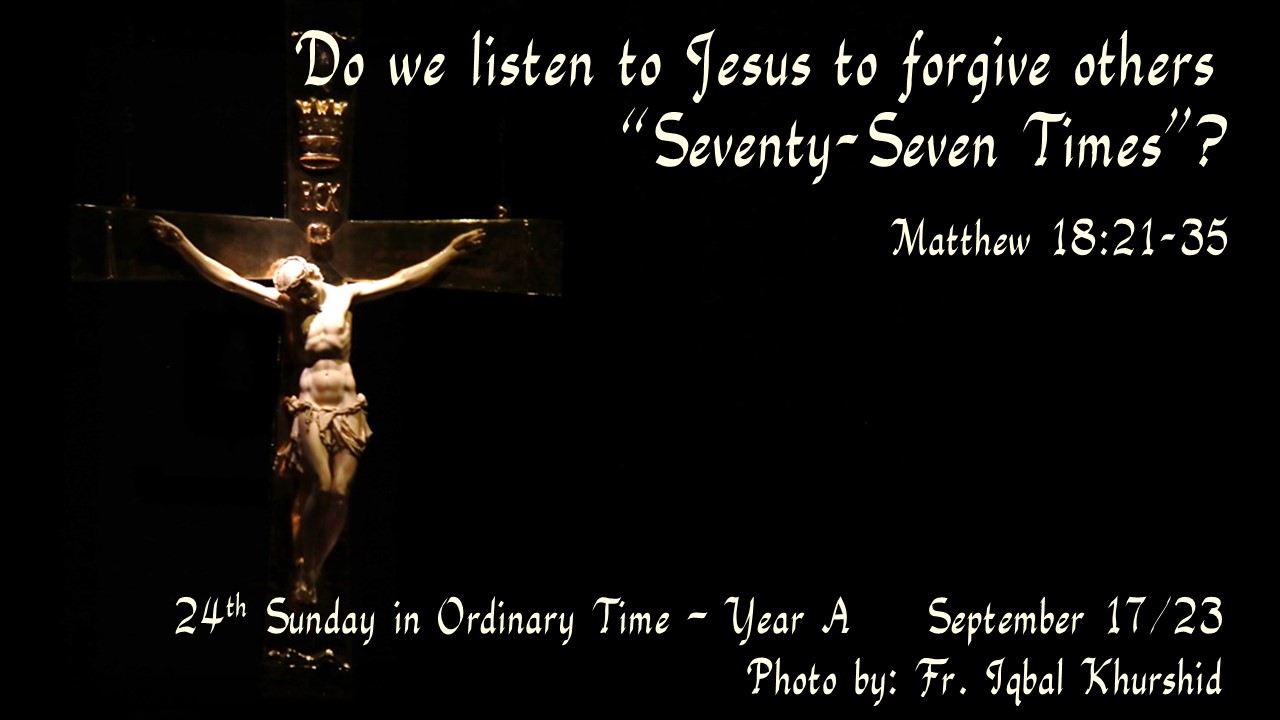
32nd Sunday in Ordinary Time – Year A ~ November 12, 2023
Openness to Divine Wisdom
These last Sundays of the Ordinary Times in Year A, are preparing us to welcome Jesus as we begin our Advent season. During Advent season “stay awake, be ready, stay alert and be ready etc.” will be the phrases we will hear frequently which will invite us to Divine Wisdom to live our lives according to the teaching of the Lord. Brethren, we ought to regard Jesus Christ as God and judge of the living and the dead. We should not hold our Saviour in low esteem for if we esteem him but little, we may hope to obtain but little from him. Moreover, people who hear these things and think them of small importance commit sin, and we ourselves sin if we do not realize what we have been called from, who has called us, and to what place, and how much suffering Jesus Christ endured on our account.
How then shall we repay him? What fruit can we bear that would be worthy of what he has given us? For how many benefits are we not in his debt! He has enlightened our minds; he has called us sons as a father does; he saved us when we were about to perish. How then shall we praise him, how repay him for his gifts? Spiritually blind, we worshiped stones and pieces of wood, gold and silver and bronze, things made by men, and our whole life was death. Darkness enfolded us, and nothing but gloom met our eyes. Then, by his will, we escaped from the cloud that enveloped us and recovered our sight. For he saw our many errors and the damnation that awaited us and knowing that apart from him we had no hope of salvation, he pitied us, and in his mercy saved us. He called us when we were not his people and willed us to become his people. Rejoice, O barren woman who never bore a child; break into shouts of joy, you who never knew a mother’s pangs; for the deserted wife shall have more children than she who has a husband. When he says: Rejoice O barren woman who never bore a child, he is speaking of us, for our Church was barren until children were given her. When he says: Break into shouts of joy, you who never knew a mother’s pangs, he means that we should not grow weary like women in labour, but tirelessly and in all simplicity offer our prayers to God. He declares that the deserted wife shall have more children than she who has a husband, because faith has now made our people who seemed to have been deserted by God more numerous than those who were thought to possess him. Another text says: I have come not to call the righteous, but sinners to repentance, for it is those who are perishing who must be saved. It is a great and wonderful work to uphold those who are falling, rather than those who already stand firm. Christ willed to save people who were in danger of losing their souls, and he has been the salvation of many. When we were on the point of perishing, he came and called us.
There was a person coming to a new village, relocating, and he was wondering if he would like it there, so he went to the Zen master and asked: do you think I will like it in this village? Are the people nice?
The master asked back: How were the people in the town where you come from? “They were nasty and greedy, they were angry and lived for cheating and stealing,” said the newcomer. Those are exactly the type of people we have in this village, said the master.
Another newcomer to the village visited the master and asked the same question, to which the master asked: How were the people in the town where you come from? “They were sweet and lived in harmony, they cared for one another and for the land, they respected each other, and they were seekers of spirit,” he replied. “Those are exactly the type of people we have in this village, said the master.
This is the exact message we receive today from the Sacred Scripture Readings. In the first Reading we come to know the attributes of wisdom. It is a song of wisdom which not only appreciates the gift of wisdom but also hails the person who desires and seeks it. This is a very interesting fact that as we are coming closer to the start our new liturgical year, we are asked to desire for wisdom. Why are we asked to reflect on the gift of wisdom? It has a twofold meaning: first of all, to understand our relationship with the Lord and secondly to prepare ourselves for his Second Coming.
Holy Father Pope Francis explaining this mystery of Jesus’ Second coming says, “In the Creed we profess that Jesus “will come again in glory to judge the living and the dead”. Human history begins with the creation of man and woman in God’s likeness and ends with the Last Judgement of Christ. These two poles of history are often forgotten; and, at times, especially faith in Christ’s return and in the Last Judgement, are not so clear and firm in Christian hearts. In his public life Jesus frequently reflected on the reality of his Final Coming”.
Let us remember that in the Ascension the Son of God brought to the Father our humanity, which he had taken on, and that he wants to draw all to himself, to call the whole world to be welcomed in God’s embrace so that at the end of history the whole of reality may be consigned to the Father. Yet there is this “immediate time” between the First and the Final Coming of Christ, and that is the very time in which we are living. The parable of the ten virgins fits into this context of “immediate” time. They are ten maidens who are awaiting the arrival of the bridegroom, but he is late, and they fall asleep. At the sudden announcement that the bridegroom is arriving they prepare to welcome him, but while five of them, who are wise, have oil to burn in their lamps, the others, who are foolish, are left with lamps that have gone out because they have no oil for them. While they go to get some oil, the bridegroom arrives, and the foolish virgins find that the door to the hall of the marriage feast is shut. They knock on it again and again, but it is now too late, the bridegroom answers: “I do not know you”. It must be very painful for those women who have been waiting for the bridegroom for hours and hours. They must be filled with anger and hate. I remember a Sunday when someone who couldn’t enter the Church as the doors were locked as per Covid protocol, but the person came for the next mass and his first question was “why did we close the doors? Just imagine if it happens to us, how would we feel? Would you blame other people or take responsibility that you could not get ready on time to join the celebrations.
There are some interesting facts in the Gospel today:
- There is a wedding taking place.
- People are invited to join.
- There are ten bridesmaids to join: five wise and five foolish.
- Wise are carrying extra oil and foolish do not care.
- Groom is delayed.
- Lamps are running out of oil.
- Groom arrives very late.
- Wise get ready to join.
- Foolish beg for the oil but are refused.
- Wise joined while foolish went to buy the oil.
- Doors are locked after everyone who was invited to join along with the wise virgins.
- Foolish are denied entry to wedding banquet.
- Foolish virgins receive very heartbreaking and painful answer “they are not known to the groom”.
- Conclusion of the parable is “Keep awake”.
These amazing facts from the parable prepare us to get ready.
As we read from the First Reading “she is easily discerned by those who love her and is found by those who seek her”. This short story will help us to understand how and where to start the action to prepare ourselves to welcome Jesus.
Once upon a time a little old wise man sitting in the village and a young man comes into him and he says, “Little old wise man, how do you become a little old wise man?” And he smiled and he said, “Well, Sonny, when I was your age, I wanted to convert the world. “And I tried my best, but the world didn’t want to be converted. “And so, I said, well maybe I am aiming too high, so what I will try to do, this time, is my village. I will bring my village so that they will understand the realities of life. And I will give them the wisdom and gather them together and show them how they can be saved. “And I tried it for a while, but they didn’t want to be saved either. “So, then I said, well, I’ll try my family. And so, I talked to my family and tried very hard to change their ways, to make them perfect in the ideal way that we should all be. “And I found out that even my family didn’t want to have anything to do with this. “So, finally,” he said to the young man, “finally, I decided I would convert myself. “And that’s when I became a little old wise man.”
What does Jesus wish to teach us with this parable? He reminds us that we must be ready for the encounter with him. Many times, in the Gospel, Jesus exhorts keeping watch, and he also does so at the end of this narrative. He says: “Watch therefore, for you know neither the day nor the hour”. But with this parable he tells us that keeping watch does not only mean not to sleep, but to be ready; in fact, all the maidens are asleep before the bridegroom’s arrival, but upon waking some are ready, and others are not. Thus, here is the meaning of being wise and prudent: it is a matter of not waiting until the last minute of our lives to cooperate with the grace of God, but rather to do so as of now. It would be good to consider for a moment: one day will be the last. If it were today, how prepared am I? But I must do this and that…. Be ready as if it were the last day: this does us good.
The Holy Father Pope Francis explains the Gospel in these words “The lamp is a symbol of the faith that illuminates our life, while the oil is a symbol of the charity that nourishes the light of faith, making it fruitful and credible. The condition for being prepared for the encounter with the Lord is not only faith, but a Christian life abundant with love and charity for our neighbour. If we allow ourselves to be guided by what seems more comfortable, by seeking our own interests, then our life becomes barren, incapable of giving life to others, and we accumulate no reserve of oil for the lamp of our faith; and this faith will be extinguished at the moment of the Lord’s coming, or even before. If instead we are watchful and seek to do good, with acts of love, of sharing, of service to a neighbour in difficulty, then we can be at peace while we wait for the bridegroom to come: the Lord can come at any moment, and even the slumber of death does not frighten us, because we have a reserve of oil, accumulated through everyday good works. Faith inspires charity and charity safeguards faith”.
All holy men and women always helped us prepare for his Final Coming with mercy and patience. It is a time of watchfulness; a time in which we must keep alight the lamps of faith, hope and charity, a time in which to keep our heart open to goodness, beauty, and truth. It is a time to live in accordance with God because we do not know either the day or the hour of Christ’s return. What he asks of us is to be ready for the encounter, ready for an encounter, for a beautiful encounter, the encounter with Jesus, which means being able to see the signs of his presence, keeping our faith alive with prayer, with the sacraments, and taking care not to fall asleep so as to not forget about God. Here are some quotes from the saints to understand the Divine Wisdom.
Faith strips the mask from the world and reveals God in everything. It makes nothing impossible and renders meaningless such words as anxiety, danger, and fear, so that the believer go through life calmly and peacefully, with profound joy -like a child, hand in hand with his mother. SAINT CHARLES DE FOUCAULD
I always begin my prayer in silence, for it is in the silence of the heart that God speaks. God is a friend of silence. We need to listen to God because it’s not what we say but what He says to us and through us that matters. Prayer feeds the soul and brings you closer to God. It also gives you a clean and pure heart. A clean heart can see God, can speak to God, and can see the love of God in others. MOTHER ST. TERESA
Prayer opens the understanding to the brightness of Divine Light, and the will to the warmth of Heavenly Love – nothing can so effectually purify the mind from its many ignorances, or the will from its perverse affections. It is as a healing water which causes the roots of our good desires to send forth fresh shoots, which washes away the soul’s imperfections, and allays the thirst of passion. ST. FRANCIS DE SALES
During the time immediately before and quite some time after my conversion, I thought that leading a religious life meant giving up all earthly things and having one’s mind fixed on divine things only. Gradually, however, I learnt that other things are expected of us in this world.
I even believe that the deeper someone is drawn to God, the more he has to ‘get beyond himself’ in this sense, that is, go into the world and carry divine life into it. ST. TERESA BENEDICTA OF THE HOLY CROSS
If we fail to do so, St. John in the Book of Revelation will draw the thin line in this way for us “I also know that you are enduring patiently and bearing up for the sake of my name, and that you have not grown weary. But I have this against you, that you have abandoned the love you had at first. Remember then from what you have fallen; repent and do the works you did at first. If not, I will come to you and remove your lampstand from its place, unless you repent”.
Once upon a time, there was a high-class rich man. As he became older, he realized that the suffering of old age was about the same for rich and poor alike. So, he gave up his wealth and class position, and went into the forest to live as a poor monk. He practiced meditation and developed his mind. He freed himself from unwholesome thoughts and became contented and happy. His peacefulness and friendliness gradually drew 500 followers to his side.
At that time, long ago, most monks usually looked serious. But there was one monk who, even though he was quite dignified, always wore at least a little smile. No matter what happened, he never lost this glimmer of inner happiness. And on happy occasions, he had the broadest smile, and the warmest laughter of all.
Sometimes monks, as well as others, would ask him why he was so happy that he always wore a smile. He chuckled and said, “If I told you, you wouldn’t believe me! And if you thought I spoke a lie; it would be a dishonor to my master.” The wise old master knew the source of the happiness that could not be wiped from his face. He made this happiest monk his number one assistant.
After the rainy season, the old monk took them to the city and as the king heard about their visit, he went to visit them. He paid his respects to the chief monk. However, the one from the forest just kept saying, “What happiness! Oh, what happiness!” He did not even stop to greet the king and show proper respect. This disturbed him, and he thought, “With all my worries, as busy as I am looking after the kingdom, I take time out for a visit and this monk does not respect me enough to even recognize me. “How insulting!” He said to the senior of the two monks, “Venerable sir, this monk must be stupid from overeating. That must be why he is so full of happiness. Does he lie around here so lazy all the time?”
The head monk replied, “Oh king, have patience and I will tell you the source of his happiness. Not many know it. He was once a king, just as rich and mighty as you! In search of wisdom and peace he left his throne and now he thinks his old happiness was nothing compared to his present joy!” Now, sitting alone in the forest with nothing to fear, he has no need for armed guards. He has given up the burden of worrying about wealth that has to be protected. Instead, free of the worry of wealth and the fear of power, his wisdom protects him and others. He advances in meditation to such inner peace and wisdom that for him earthly happiness is nothing than heavenly.
Do we choose Divine Wisdom to live our lives according to the teaching of Jesus?
Other Sermons In This Series

15th Sunday in Ordinary Time Year C ~ July 10, 2022
July 07, 2022

23rd SUNDAY IN ORDINARY TIME YEAR B ~ SEPTEMBER 8, 2024
September 05, 2024

24th Sunday in Ordinary Time – Year A ~ September 17, 2023
September 13, 2023

